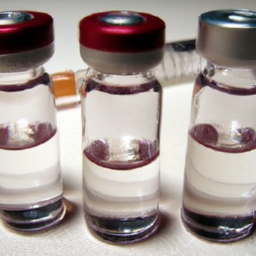Can Hormone Replacement Therapy (HRT) Influence Blood Sugar Levels?
In this article, you will learn about the potential impact of hormone replacement therapy (HRT) on blood sugar levels. HRT is commonly used to manage symptoms of menopause and can involve the use of estrogen and progestin hormones. Research suggests that HRT may have an effect on blood sugar regulation, particularly in individuals with diabetes or pre-diabetes. Understanding these potential effects can help you make informed decisions about your health and discuss any concerns with your healthcare provider.
Introduction
What is hormone replacement therapy?
Hormone replacement therapy (HRT) is a medical treatment that involves the use of hormones to supplement or replace hormones that the body is no longer producing in adequate amounts. It is commonly used to alleviate symptoms of menopause in women, but can also be prescribed for other conditions, such as hypogonadism in men. HRT typically involves the administration of estrogen and/or progesterone, either in the form of pills, patches, creams, or injections.
What are blood sugar levels?
Blood sugar levels, also known as blood glucose levels, refer to the amount of sugar (glucose) present in the bloodstream. Glucose serves as the main source of energy for the body’s cells and is regulated by insulin, a hormone produced by the pancreas. Maintaining stable blood sugar levels is crucial for overall health, as both low and high blood sugar levels can have significant adverse effects on the body.
Impact of HRT on Blood Sugar Levels
Positive effects on blood sugar levels
Research has suggested that HRT may have positive effects on blood sugar levels, particularly in postmenopausal women. Estrogen, one of the key hormones involved in HRT, has been shown to enhance insulin sensitivity in the body. Insulin sensitivity refers to the body’s ability to respond effectively to insulin, resulting in better control of blood sugar levels. By improving insulin sensitivity, HRT may help to reduce the risk of developing insulin resistance and diabetes.
Negative effects on blood sugar levels
However, there is also evidence to suggest that HRT can have negative effects on blood sugar levels. Some studies have found that HRT may increase the risk of developing high blood sugar levels or exacerbate existing diabetes. This is thought to be more common in women who are overweight or have a predisposition to diabetes. It is important to note that the impact of HRT on blood sugar levels can vary between individuals, and further research is needed to fully understand these effects.
Mechanism of Action
How does HRT affect blood sugar levels?
The mechanism by which HRT affects blood sugar levels is not fully understood. However, it is believed that estrogen, the primary hormone used in HRT, plays a key role in regulating glucose metabolism. Estrogen receptors are present in various tissues throughout the body, including the liver, muscle, and adipose tissue. These receptors are thought to influence insulin sensitivity and glucose uptake, thereby impacting blood sugar levels.
Hormones involved in blood sugar regulation
In addition to estrogen, other hormones involved in HRT, such as progesterone, may also have indirect effects on blood sugar levels. Progesterone has been found to affect insulin secretion and possibly contribute to insulin resistance. It is important to consider the interplay between these hormones and their potential influence on blood sugar regulation when assessing the impact of HRT on diabetes risk.
Benefits of HRT
Improvement in insulin sensitivity
One of the key benefits of HRT is the potential improvement in insulin sensitivity. As mentioned earlier, estrogen, the primary hormone used in HRT, has been shown to enhance insulin sensitivity in the body. By improving insulin sensitivity, HRT may help to reduce the risk of developing insulin resistance and diabetes. This can have significant implications for individuals at risk of metabolic disorders.
Enhancement of glucose metabolism
HRT may also enhance glucose metabolism, leading to better control of blood sugar levels. Estrogen has been found to promote glucose uptake in various tissues, such as muscle and adipose tissue. By increasing glucose uptake, HRT may help to maintain stable blood sugar levels and prevent sudden spikes or drops in glucose.
Risks of HRT
Increase in blood glucose levels
While HRT has potential benefits for blood sugar management, it is important to consider the potential risks as well. Some studies have suggested that HRT, particularly estrogen therapy, may increase the risk of high blood sugar levels or exacerbate existing diabetes. This risk may be higher in individuals who are overweight or have a predisposition to diabetes. Therefore, close monitoring of blood glucose levels is crucial for individuals undergoing HRT, especially those with diabetes or a family history of diabetes.
Potential development of insulin resistance
There is also evidence to suggest that HRT may contribute to the development of insulin resistance in certain individuals. Insulin resistance refers to the reduced ability of cells to respond to insulin, leading to elevated blood sugar levels. This condition is a key risk factor for the development of type 2 diabetes. It is important to evaluate the individual’s hormonal profile, medical history, and overall health before considering HRT as a treatment option.
Factors Influencing Blood Sugar Levels
Dosage and duration of HRT
The dosage and duration of HRT can significantly influence blood sugar levels. Higher doses of estrogen or longer duration of HRT may have a greater impact on blood sugar regulation. It is important for healthcare providers to carefully evaluate the individual’s specific needs and prescribe the appropriate dosage and duration of HRT to minimize potential risks and maximize benefits.
Individual variations in hormone response
It is important to recognize that individual variations in hormone response can also impact blood sugar levels. Some individuals may experience improvements in blood sugar control with HRT, while others may see adverse effects. Factors such as genetics, lifestyle, and overall health can all influence how an individual’s body responds to hormone therapy. Therefore, a personalized and individualized approach to HRT and blood sugar management is essential.
Considerations for Diabetic Patients
Consultation with healthcare provider
For individuals with diabetes or a history of diabetes, it is crucial to consult with a healthcare provider before starting HRT. The healthcare provider can assess the individual’s medical history, current diabetes management plan, and other relevant factors to determine the suitability of HRT and guide the individual in making informed decisions.
Monitoring blood sugar levels during HRT
Regular monitoring of blood sugar levels is essential for individuals undergoing HRT, especially those with diabetes. Close monitoring allows for early detection of any changes or abnormalities in blood sugar levels, enabling timely adjustments to the treatment plan if necessary. This can help to minimize potential risks and ensure optimal blood sugar control.
Learn what are the symptoms of blood sugar issues during menopause
Clinical Studies and Findings
Research on the relationship between HRT and blood sugar levels
There have been numerous studies investigating the relationship between HRT and blood sugar levels. Some studies have reported positive effects of HRT on blood sugar regulation, while others have highlighted potential risks. The results of these studies are not always consistent, highlighting the need for further research to fully understand the impact of HRT on blood sugar levels.
Highlighted study results
One study published in the Journal of Clinical Endocrinology & Metabolism found that estrogen therapy improved insulin sensitivity and glucose uptake in postmenopausal women. Another study published in the journal Diabetes Care reported a higher risk of diabetes in women undergoing estrogen-progestin therapy. These contrasting results emphasize the complexity of the relationship between HRT and blood sugar levels and underscore the need for individualized assessment and monitoring.
Recommendations and Guidelines
Guidance for healthcare providers
Healthcare providers play a crucial role in guiding individuals considering HRT, particularly with regards to its potential impact on blood sugar levels. They should assess each patient’s individual needs, medical history, and current health status to determine the most appropriate treatment plan. Regular monitoring of blood sugar levels and ongoing evaluation of the patient’s response to HRT should also be implemented.
Advice for individuals considering HRT
For individuals considering HRT, it is important to have open and honest discussions with healthcare providers. They can provide guidance on the potential benefits, risks, and alternatives to HRT, taking into account the individual’s specific health circumstances. Additionally, individuals should closely monitor their blood sugar levels and report any changes or concerns to their healthcare provider.
Conclusion
In conclusion, HRT can have both positive and negative effects on blood sugar levels. While estrogen therapy has been shown to improve insulin sensitivity and glucose metabolism, there is also evidence to suggest an increased risk of high blood sugar levels or insulin resistance. The impact of HRT on blood sugar levels can vary between individuals, highlighting the importance of an individualized approach guided by healthcare providers. Regular monitoring of blood sugar levels and open communication with healthcare providers are essential for optimal management of blood sugar levels during HRT. By carefully evaluating the risks and benefits, individuals can make informed decisions about their healthcare journey.







